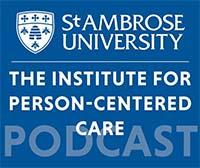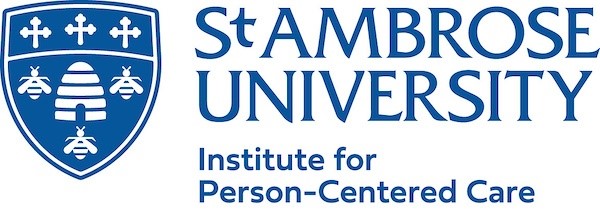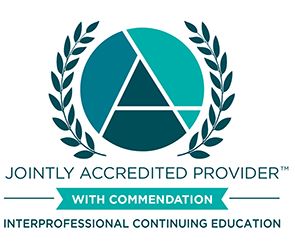
IPCC Podcast: Lifting the Cloud - Transcranial Magnetic Stimulation and the Treatment of Major Depression
 |
The Institute for Person-Centered Care at St. Ambrose University is challenging the status quo of health and wellness in our communities. Join us as we delve into cutting edge strategies to tackle health and wellness challenges through innovation and a person-centered perspective. Whether you are a health and human service practitioner, or community member, our discussions offer valuable insights tailored to your interests and needs. Tune in and be part of the transformative discussions where person-centered care comes alive!
In this episode, listeners will gain an in-depth exploration of Transcranial Magnetic Stimulation (TMS) and its impact on psychiatric disorders. TMS has demonstrated effectiveness in numerous clinical trials and serves as a valuable adjunct to traditional therapy. Designed for clinicians and mental health professionals and those they serve, this podcast offers insights into:
- Identifying appropriate patient populations for TMS therapy.
- Understanding the TMS treatment process from start to finish.
- Exploring the role of neuromodulation in reshaping brain function for long-term improvement.
- Reviewing clinical outcome data supporting TMS in the treatment of major depressive disorder.
Gain a deeper understanding of how TMS and neuromodulation techniques are advancing the field of functional neuropsychiatry and providing new hope for patients.
Episode Learning Objectives:
By the end of this episode, individuals as members of the health care team will be able to:
- Identify appropriate patient populations for Transcranial Magnetic Stimulation (TMS) treatment of psychiatric disorders.
- Describe the treatment process of Transcranial Magnetic Stimulation.
- Describe possible adverse events associated with Transcranial Magnetic Stimulation.
- Explain how neuromodulation techniques impact long-term changes in brain network functioning.
- Discuss clinical outcome data for Transcranial Magnetic Stimulation treatment.
Statement of Need and Purpose
Mounting evidence consistently demonstrates that integrating person-centered care approaches into health and human services leads to heightened satisfaction among both patients and providers, alongside improvements in quality and safety outcomes.
Interdisciplinary team members do not always effectively coordinate care, prioritizing the individual or population at the center to impact positive health outcomes. These team members can enhance their knowledge, skills, and attitudes about person-centered care by listening to this podcast.
Professionals spanning health, social services, and beyond will engage with experts, students, and community members through storytelling, sharing innovations, and applying enriched practices of person-centered care to address both current and future challenges in their respective fields.
Intended Audience
This podcast meets the professional development needs of physicians, nurses, physician assistants, pharmacists, psychologists, social workers, caregivers, and others with interest in person-centered care.
Elements of Competence
This educational activity is designed to change learner competence and focuses on the following competency areas:
- The American Board of Medical Specialties: Practice-based learning improvement, Interpersonal and Communication Skills, Professionalism, and Systems-based Practice
- Nursing and Interprofessional: Values/Ethics for Interprofessional Practice, Roles/Responsibilities, Interprofessional communication and Teams, and Teamwork
- Center for the Advancement of Pharmacy Education: Communication, Cultural Sensitivity, Educator, Health and Wellness, Innovation and Entrepreneurship, Interprofessional Collaboration, Leadership, Patient Advocacy, Patient-Centered Care, Population-Based Care, Professionalism, and Self-Awareness
- Social Impact and Belonging: Engage in Self-reflection, Address Differences in Health Outcomes, and Value Culturally Centered Care
Global Learning Objectives
By the end of this podcast series, individuals as members of the health care team will be able to:
- Describe and apply the tenets of person-centered care.
- Discuss insights, best practices, and innovative solutions for person-centered care in their individual practice and among the healthcare team.
- Explain the role of the care team in applying the principles of person-centered care to enhance population health.
The University of Wisconsin–Madison Interprofessional Continuing Education Partnership (ICEP) and St. Ambrose University Institute for Person-Centered Care gratefully acknowledge(s) our sponsors: St. Ambrose University, Kokjohn Grant, Presentation Sisters of South Dakota, Vera French Mental Health Center, the University of Wisconsin–Madison, School of Nursing (in-kind accreditation support), and KALA FM Radio (in-kind technology support ).
Host
 | Ann Garton, DNP, FPCC, RN, CNE, Associate Professor, Director of the Institute for Person-Centered Care, St. Ambrose University Dr. Ann Garton holds the roles of Professor in Nursing at St. Ambrose University and Director of the University's Institute for Person-Centered Care. Her doctorate focused on global population health. Throughout her career, she has worked in diverse settings, fostering quality person-centered care for our most vulnerable populations. She has been recognized as a Fellow of Person-Centered Care by Planetree International. As host of the IPCC Podcast, she shares best practices in person-centered care with experts from across the country. |
Guests
Henry Emerle, MD | Henry Emerle, MD, Interim Medical Director, Vera French Mental Health for Healthy Living Dr. Emerle is the Interim Medical Director at Vera French Mental Health for Healthy Living and practicing psychiatrist. He received a Bachelor of Science in Cell and Structural Biology & Psychology, and a Master of Science in Molecular Physiology & Integrative Biology at the University of Illinois College of Medicine at Urbana-Champaign, his MD from the University of Michigan and completed his Residency in Adult Psychiatry |
| Rich Whitaker, PhD, Vera French Mental Health for Healthy Living Dr. Rich Whitaker began his career in the Quad Cities in 1994 as a doctoral intern at the historic Marriage and Family Counseling Service in Rock Island, Illinois as part of his Ph.D. in Marriage and Family Therapy from Brigham Young University. Since that pivotal year, Dr. Whitaker has pursued a career in community mental health, providing services, supervision, and executive administration at community mental health centers in Grand Island, Nebraska (9 years as COO) and Jasper, Indiana (12 years as CFO). Since January 2017, Rich has served as the CEO of Vera French Community Mental Health Center in Davenport, Iowa.
|
Planning Committee
| *Ann Garton, DNP, FPCC, RN, CNE | Tracy Mrochek, MPA, RN, NPD-BC | Andrew Repp, PHD |
Kari Crowder, MSN | Sarah Oliver, PHD | Cheryl True MD, DipABLM, FACLM |
Julie Kettmann, PhD | Janelle Pillard, MSPA | Emily Vyverberg, PharmD |
* Activity Chair
Policy on Faculty and Sponsor Disclosure
It is the policy of the University of Wisconsin–Madison Interprofessional Continuing Education Partnership (ICEP) to identify, mitigate and disclose all relevant financial relationships with ineligible companies* held by the speakers/presenters, authors, planners, and other persons who may influence the content of this accredited continuing education (CE). In addition, speakers, presenters and authors must disclose any planned discussion of unlabeled/unapproved uses of drugs or devices during their presentation.
For this accredited continuing education activity all relevant financial relationships have been mitigated and detailed disclosures are listed below.
Ineligible companies are those whose primary business is producing, marketing, selling, re-selling, or distributing healthcare products used by, or on, patients. The ACCME does not consider providers of clinical services directly to patients to be ineligible companies.
| NAME | ROLE(S) | FINANCIAL RELATIONSHIPS DISCLOSURE | DISCUSSION OF UNLABELED/UNAPPROVED USES OF DRUGS/DEVICES IN PRESENTATION? |
| Ann Garton, DNP, FPCC, RN, CNE | Activity Chair, Planner, Host | No relevant relationships with ineligible companies to disclose | No |
| David Baker | Committee Member | No relevant relationships with ineligible companies to disclose | No |
| Kari Crowder, MSN | Planner | No relevant relationships with ineligible companies to disclose | No |
| Henry Emerle, MD | Speaker | No relevant relationships with ineligible companies to disclose | No |
| Julie Kettmann, PhD | Planner | BodyMD (Independent Contractor - Consultant) | No |
| Tracy Mrochek, MPA, RN, NPD-BC | Planner, Peer Reviewer | No relevant relationships with ineligible companies to disclose | No |
| Sarah Oliver, PhD | Planner | No relevant relationships with ineligible companies to disclosure | No |
| Janelle Pillard, MSPA | Planner | No relevant relationships with ineligible companies to disclose | No |
| Andrew Repp, PHD | Planner | No relevant relationships with ineligible companies to disclose | No |
| Cheryl True, MD | Planner | No relevant relationships with ineligible companies to disclose | No |
| Emily Vyverberg, PharmD | Planner | No relevant relationships with ineligible companies to disclose | No |
| Richard K. Whitaker, Jr., Ph.D. | Speaker | No relevant relationships with ineligible companies to disclose | No |
Accreditation Statement
 | In support of improving patient care, this activity has been planned and implemented by the University of Wisconsin–Madison Interprofessional Continuing Education Partnership (ICEP) and St. Ambrose University Institute for Person-Centered Care. The University of Wisconsin–Madison ICEP is jointly accredited by the Accreditation Council for Continuing Medical Education (ACCME), the Accreditation Council for Pharmacy Education (ACPE), and the American Nurses Credentialing Center (ANCC), to provide continuing education for the healthcare team. |
Credit Designation Statements
American Medical Association (AMA)
The University of Wisconsin–Madison ICEP designates this enduring activity for a maximum of 1.00 AMA PRA Category 1 Credits™. Physicians should claim only the credit commensurate with the extent of their participation in the activity.
American Nurses Credentialing Center (ANCC)
The University of Wisconsin–Madison ICEP designates this enduring activity for a maximum of 1.00 ANCC hours.
Accreditation Council for Pharmacy Education (ACPE)
The University of Wisconsin–Madison ICEP designates this enduring activity for 1.00 hours or .10 CEUs. Credit can be earned by successfully completing the activity and the evaluation. Credit will be provided to NABP CPE Monitor within 60 days after the activity completion.
Universal Activity Number (UAN): JA0000358-9999-25-029-H99-P
AAPA Credit Designation Statement
The University of Wisconsin–Madison ICEP has been authorized by the American Academy of PAs (AAPA) to award AAPA Category 1 CME credit for activities planned in accordance with AAPA CME Criteria. This activity is designated for 1.00 AAPA Category 1 Self‐Assessment CME credits. Approval is valid until 11/14/2024. PAs should only claim credit commensurate with the extent of their participation. |
 | As a Jointly Accredited Organization, the University of Wisconsin–Madison ICEP is approved to offer social work continuing education by the Association of Social Work Boards (ASWB) Approved Continuing Education (ACE) program. Organizations, not individual courses, are approved under this program. Regulatory boards are the final authority on courses accepted for continuing education credit. Social workers completing this course receive 1.00 enduring continuing education credits. |
American Psychological Association (APA)
 | Continuing Education (CE) credits for psychologists are provided through the co-sponsorship of the American Psychological Association (APA) Office of Continuing Education in Psychology (CEP). The APA CEP Office maintains responsibility for the content of the programs. |
Continuing Education Units (CEUs)
The University of Wisconsin–Madison, as a member of the University Continuing Education Association (UCEA), authorizes this program for 0.10 continuing education units (CEUs) or 1.00 hours.
Available Credit
- 1.00 AAPA Category 1 CME
- 1.00 ACPE Contact Hours - Pharmacist
- 1.00 AMA PRA Category 1 Credit™
- 1.00 ANCC Contact Hours
- 1.00 APA CE Credits
- 1.00 University of Wisconsin–Madison Continuing Education Hours
- 1.00 Approved for AMA PRA Category 1 Credit™
Registration for this activity can only be completed through the ICEP Learning Portal. Attendee registrations made through any other sites cannot be honored. UW-Madison ICEP is not able to refund fees paid through unaffiliated registration sites, such as eMedEvents.com, MedConfWorld.com, EventEgg.com, and 10times.com. Please report any unauthorized websites or solicitations for registrations to [email protected].
Accessibility
If you need anything to participate in this program, please contact [email protected].
Required Hardware/software
Free, current version of Internet Explorer, Firefox, Safari, or Chrome with audio. Some older browsers and Microsoft Edge could produce error messages or not display the content correctly.
Current Adobe Acrobat Reader, or other PDF viewer.

 Facebook
Facebook X
X LinkedIn
LinkedIn Forward
Forward
